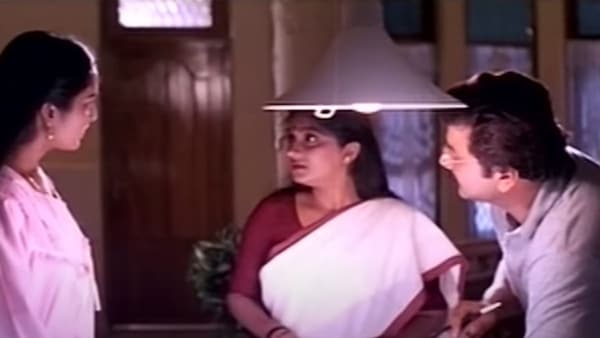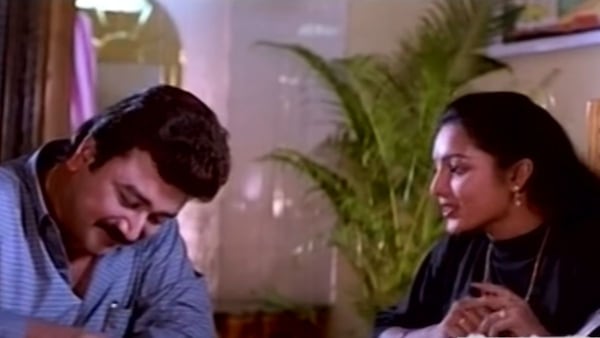Kaliveedu: A film that pulled the Malayalam industry back to the Dark Ages
Revisiting the supposed light-hearted family drama 25 years after its release

Last Updated: 04.53 PM, Dec 09, 2021
The 90s and 2000s for the Malayalam film industry was an era of transition, but this evolution of the industry was one that can only be viewed as regressive in terms of themes and subtext. It coincided with the rise of satellite film rights, and it may have influenced how stories and characters were written. Films such as Narasimham, Summer in Bethlehem, and Ravanaprabhu have aged poorly, and a deeper analysis of these films reflects badly on the industry. The influence films have on culture and society as a whole cannot be understated. Therefore, an argument could be made that regressive themes could inadvertently reshape the conscience of the audiences. It is one of the reasons why authoritarian regimes have always used film industries as one of their primary tools of spreading their propaganda.
While most films from the 90s and 2000s in Kerala glorified classism and casteism subtly in their narrative, Kaliveedu glorified patriarchy to an extent that calling it ‘subtle’ would be an exaggeration. Hypermasculinity and patriarchy have also been closely associated with several movies since the 90s, but these were intricately woven into narratives that almost normalised the idea of submissive women and the larger than life men. It also plays into the idea that strong female characters are misguided, and in some cases regarded immoral. Kaliveedu, starring Jayaram, Manju Warrier, Vani Viswanath, and Jagadish, is an amalgamation of all the aforementioned problematic themes.

There is nothing innocuous with the basic plot of the movie. In one sentence it could be described as a story about a marriage on the rocks, while friends and family rally to get the couple back together. To understand why this story is packed with a lethal dose of medieval ideologies, Jayaram’s character Mahesh Sivan must be scrutinised. Mahesh, an army brat, isn’t the stereotype, but instead, he is a stickler for discipline. He also likes to remind everyone of the same. This cannot be considered a flaw in his character, but when it’s mixed with draconian ideals of misogyny it can be a dangerous combination.
The narrative positions him as a ‘white knight’ who has a respectable job and is a revered member of society. His idea of a wife is someone who is duty-bound to serve him at all times and to make his life comfortable. In other words, all he wanted was a glorified housemaid. The woman he does eventually marry, Mrudula, is not the submissive type as Mahesh envisioned. While it is perfectly fine to tell a story about two such individuals, it becomes a cause for concern when the narrative leans towards Mahesh’s side of the argument. Whereas Mridula is depicted as irrational, and the women who help her are characterised as entitled and disillusioned.

Unfortunately, this was not the worst part of the film. In order to ‘teach’ Mrudula how to become a ‘good housewife’, Mahesh enlists his friend’s wife's help by pretending to be a maid to show Mrudula how to be the ‘ideal’ housewife. As disturbing as it may sound, this level of deception was never addressed by any of the characters, and the narrative shockingly attempts to justify it. In fact, Vani Vishwanath’s character plays the role of the metaphorical ‘moral compass’ — a broken one at that. She is written as someone who has embraced the stereotypical ‘western culture’ only for her to do a complete 180 degree turn at the end and confess that the ‘western culture’ is rotten, with hints of xenophobia sprinkled in there as well.
Towards the end of the story, Mrudula goes back to Mahesh, fully aware of what she is stepping into. Even though the ending is portrayed as a happy one for the lead characters, in reality, it is a tragedy by all accounts, for Mrudula in particular. Kaliveedu unfortunately set the tone for regressive films for the next decade and a half in the Malayalam industry. While it may not have been the biggest hit of that era, it gained popularity after it was released on television. It often goes unnoticed how an industry could fall into a rut and a pattern of mediocrity as a by-product of regressive themes incorporated in films. Fortunately, the industry in Kerala has since recovered and has produced some of the finest films in the county over the past decade.

 Premium
Premium